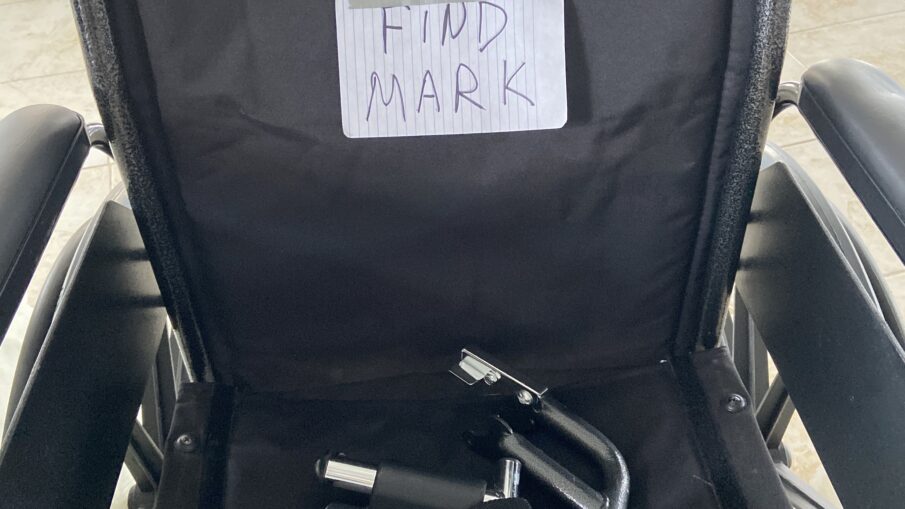Travel to northern Guatemala on a medical mission, and you soon will discover tragedies and triumphs among people who desperately lack what is commonplace elsewhere.
A basic example: wheelchairs.
In much of North America and western Europe, even people considered under-resourced can procure a wheelchair. But in many parts of the world, that is not the case.
The World Health Organization (WHO) estimates about 80 million people in the world need wheelchairs.
Obtaining that wheelchair in many countries proves a near-hopeless challenge. WHO reports there are countries where fewer than three percent of those in need have any chance of obtaining the simple yet liberating mobility device.
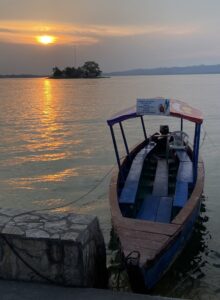
In San Benito, a city of about 60,000 people on the shores of Lake Petén Itzá , the needs are overwhelming.
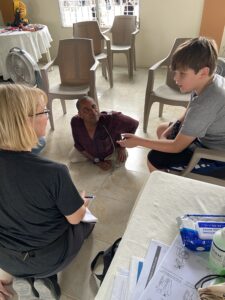
Diabetes complications rarely are treated in a timely manner, leading to many amputations. Lawless, violent attacks sometimes leave victims paralyzed and unable to work.
52-year-old Youani was born without legs and has been begging in the streets for 30 years. An old wheelchair he had decades ago simply fell apart.
Natiulda was a floor nurse at a small hospital until a shooting left her paralyzed. The hospital offered her an administrative job, but she was largely unable to perform because she lacked mobility. No wheelchair was available to her.
Edwin was ambushed by thieves when returning to his farm with groceries. His attackers stabbed him seven times in the back — severing his spinal cord — and left him to bleed to death. Despite his paralyzed legs, he was able to crawl using his elbows to a place where someone spotted him and summoned medical help. Edwin has no way of obtaining his own wheelchair.
Wheels for the World™ celebrates 30 years
In Guatemala and beyond, children with disabilities are crawling in the dirt, objects of ridicule and absentees from school. Disabled adults crawl in filth too, begging for enough money to buy their next meals. The lack of mobility becomes an easy excuse for hiding people with special needs in back rooms or dank basements. Many cultures see disability as a shameful punishment from God.
My trip to San Benito was with the ministry Joni and Friends. It has distributed more than 227,000 donated wheelchairs in a program they call Wheels for the World™, which celebrated its 30th anniversary in 2024. Teams of certified volunteer physical therapists and mechanics visit each country and conduct every seating, making certain the wheelchairs are good physical fits for the recipients. In the months prior to these seatings, donated wheelchairs emerge from a network of stateside prison workshops, where inmates have acquired skills necessary to make like-new restorations.
As an athletic 17-year-old, ministry founder Joni Eareckson Tada broke her neck after a summer diving accident along Chesapeake Bay in 1967. Doctors quickly determined she would be a quadriplegic for the rest of her life.
Suicidal at first, she eventually begged God to “show me how to live like this!” A worldwide ministry emerged. From its mission statement: Joni and Friends communicates the Gospel and mobilizes the global Church to evangelize, disciple and serve people living with disability.
Early on, Joni rejected the phrase “confined to a wheelchair,” realizing that it provided mobility and freedom rather than confinement. Wheels for the World™ developed amid that simple principle as the overwhelming wheelchair needs grow in the developing world.
Joni found that many who lack wheelchairs also have not heard the Gospel of Jesus Christ. Millions more never darken the doors of local churches. From the beginning, each wheelchair came with a Gospel presentation, a copy of Scripture in the native language, and follow-ups with a local congregation.
Wheelchair No. 417213
I chose the San Benito trip for a simple yet compelling reason: my late mother’s wheelchair was to be given to someone during five days of distribution in which scores of people in need received the gift of mobility.
In her 98 years of life, my Canadian-born mother never visited Guatemala. She passed away in December 2022. Her life began 100 years ago in a farmhouse near Petrolia, Ontario.
Jesus Soida Castillo was born in Guatemala about 33 years later.
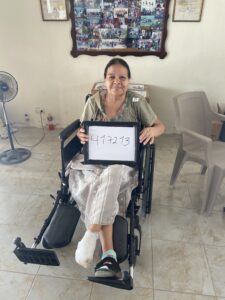
Mrs. Castillo arrived in San Benito at Iglesia Sendero de Vida, a church in San Benito that offered space for our five-day wheelchair distribution.
This once-active pillar of her local church and community had been sidelined by diabetes-related amputation. On this day, Mrs. Castillo, daughter Rosie and granddaughter Amy braved near-record heat — 102 degrees with no air conditioning in the church. Plastic chairs the congregation uses for worship towered in high stacks along the sanctuary walls, creating floor space for dozens of wheelchairs and three seating stations. Each featured a physical therapist, at least two assistants ready to make mechanical modifications, and an interpreter.
Mid-afternoon on our second day, staff called the Castillos to the first seating station at the front of the sanctuary. They met physical therapist Karen, along with David and Rebecca. The team began hearing Mrs. Castillo’s story through the interpreter. Careful notes detail each recipient’s needs. Guesswork has no place here. Karen asked many questions as measurements were taken and recorded.
Karen looked at the inventory and saw wheelchair 417213 as an excellent choice. She and David removed the “Find Mark” sign I had attached. Serving as the team’s photographer, I didn’t want to be somewhere else when seating began.
My full attention focused on Mrs. Castillo’s face as Rebecca and David slowly lowered her into chair 417213.
In seconds, she gave the team two thumbs up, a communication that needed no translation. Then she pointed to heaven and joyfully whispered, “Dios! Dios!”
Diabetes had required amputation of half her left foot a matter of days after my mother passed away.
For personal reasons, her story left me stunned.
It happens that my late father, also a diabetic, had a nearly identical amputation performed on his right foot. As Mrs. Castillo described the daily medical care she needed, the words reminded me of the very things my mother had done to care for him: elevate the amputation, wash it, and apply a medical salve several times a day. I quickly recalled my father enduring that identical routine, helped at every turn by my mother, who put aside her squeamishness and provided necessary care.
As I told Mrs. Castillo that the woman who previously used her new chair cared for a wound like this every day, we both choked back tears.
Who would expect to find commonalities between two women separated by thousands of miles and born a generation apart?
Both enjoyed long marriages to Christian spouses who joined them in church work. Mrs. Kahler was married to husband Marvin for more than 52 years prior to his passing at age 82. They teamed up to call on new church visitors and share the Gospel. Marvin served as an ordained Southern Baptist deacon. They reared my sister and me.
Mrs. Castillo and her husband Ramon enjoyed a 40-year marriage prior to his COVID-related death in 2021. He held the church treasurer role for 17 years. For decades, the couple cleaned the worship center and arranged chairs prior to every Sunday service. They reared seven children.
Talking to People about God
Near the end of our meeting, I asked daughter Rosie to describe her mother. She called her a friendly woman who liked to talk to people about God. Mrs. Castillo put her hand on my arm as she noticed tears in my eyes. My outgoing mother also had looked for openings to share the Gospel.
One example: a few months before her death, we were tidying my mom’s room at the assisted living facility. I came across stray envelopes on her dresser. Among them appeared a mailer from Joni and Friends with a graphic that proclaimed, “Hope has a name: Jesus!” As I started to remove it, I received immediate direction to “leave that right there! I want the caregivers to see that. I’m hoping they’ll ask me about it.”
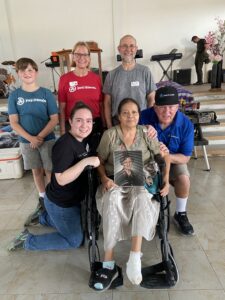
When Mom died, Joni Eareckson Tada took a moment to write me a personal letter. Among her thoughts: “I am so glad that your mother knew Christ, and knew him well… As I think of your loss, I cannot be too sad. At her age, she was most likely looking forward to that glorious day of no more pain, tears, night, disease, or disability.”
Earth is Not an Eternal Home
In San Benito, we met people who will rejoice at Joni’s observation that this imperfect earth exists as merely a temporary home for Christians.
Stories of vicious, unpunished attacks were all too common. Single parents of special needs children we met spend most of their waking hours away from home, working jobs that pay the equivalent of $3 or $4 USD/day. They struggle to put food on the table and provide care. Forced daily choices pit food purchases against costs for what limited medical care is available.
Mrs. Castillo’s story, while not the most dramatic here, proves disturbing. Rosie says her mother fought depression and felt trapped in her home, unable to go anywhere without assistance. No wheelchair was available for her.
Because Wheels for the World™ brought my mother’s wheelchair to San Benito, we can rejoice in knowing Mrs. Castillo’s pain decreases as her visits to church increase. Wheelchair 417213 could help Mrs. Castillo regain her role as a church leader while providing the mobility and comfort everyone deserves.
Consider that in 2024, that wheelchair was one of 193 distributed in San Benito, and one of nearly 11,000 wheelchairs that will serve people in 42 international locations through Joni and Friends. The week in San Benito ended with 18 professions of faith in Jesus Christ. In a recent year, Wheels for the World™ outreaches resulted in 1,790 professions of faith.
Stories of these donors and recipients will not make headlines. But those who make mission trips to places in need uncover an incredible surprising travel find at the intersection of need and mercy.
Wheels for the World™
More than 20 wheelchair trips are planned for 2025 with Joni and Friends. Check the website for new locations and serving opportunities.

